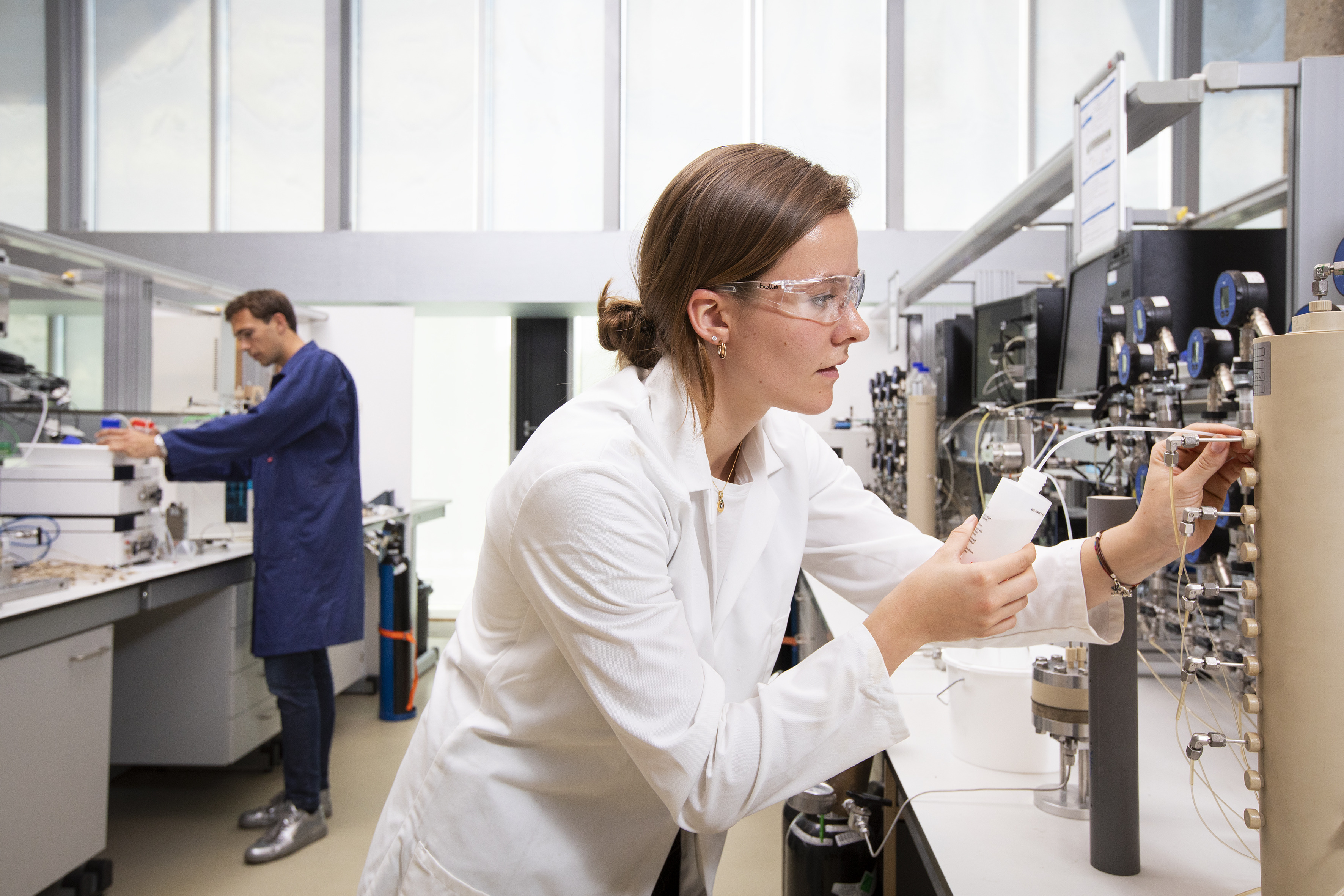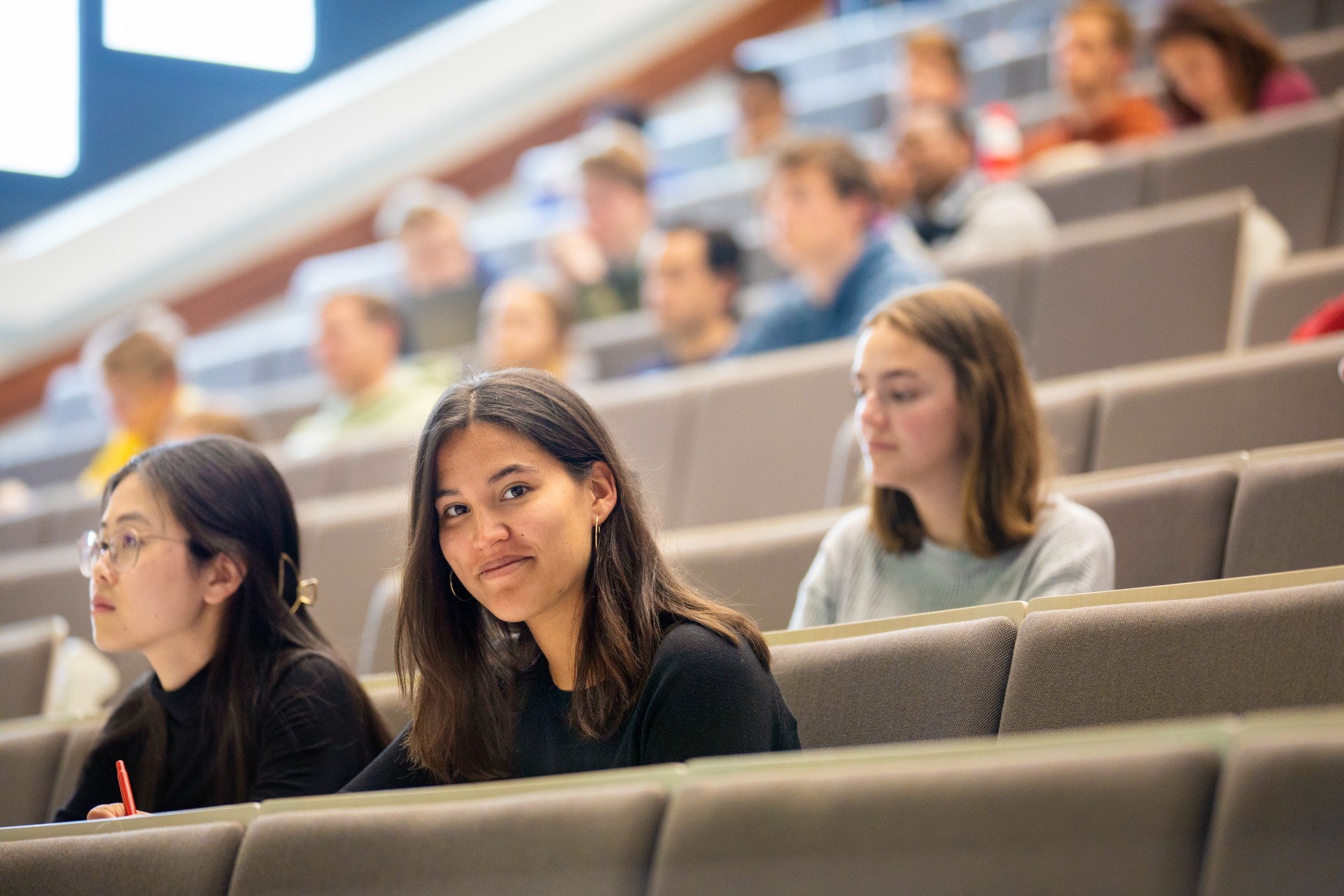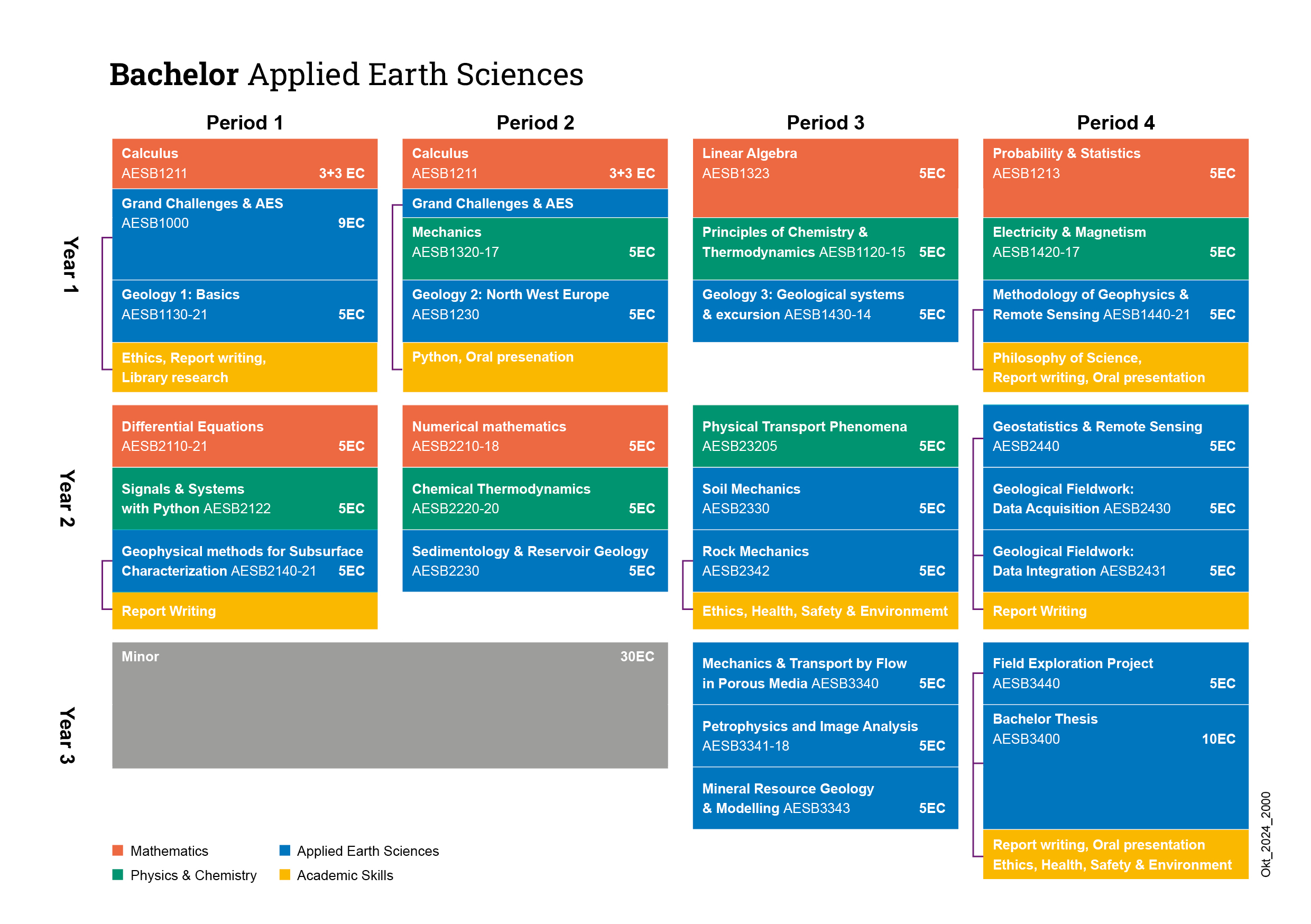What will I learn?
During your bachelor's you will become acquainted with a fascinating, multifaceted field. You follow a wide range of subjects and are active in the 'real world' from the start. Thanks to the many excursions, fieldwork assignments and study trips, you apply your theoretical knowledge and learn the ins and outs of the field, both in the Netherlands and abroad.
The Bachelor programme Applied Earth Sciences blends knowledge and skills in Earth sciences, Mathematics, Physics, and Chemistry to obtain a deep understanding on how the Earth’s system functions, how the changing Earth and climate can be observed and monitored, and how we can treat the earth responsibly. You will obtain all basic skills needed for exploration of energy and resources, including how to handle (big) Earth datasets and models. Interesting to know is that we can now use the same subsurface knowledge, previously gained in the petroleum industry, in a sustainable way to move forward with the energy transition. For example, you will learn how we can apply geothermal heat safely and on a large scale in the built environment, what the possibilities are for CO2 or hydrogen storage in the subsurface, and how to determine the best location of an offshore wind farm. Similarly, we dive into the exploration and mining of critical raw materials like lithium, cobalt and copper: how did we used to do this, and how should we and will we do this in the future?
Moreover, you will learn about how to monitor and predict changes in Earth, due to natural and due to anthropogenic processes, so engineering of atmosphere, surface and subsurface. This is a crucial step in ensuring a safe and healthy living environment. The Bachelor programme of Applied Earth Sciences is designed to deliver you with the engineering skill set that you need to find solutions to pressing issues.
Mathematics & AES
Most high school pupils expect an combination of geography and mathematics when hearing about Applied Earth Sciences. But in practice, the mathematics provides the basis for the programme.
Read moreDuring the bachelor you follow 5 mathematics courses, but in practically all other subjects you will be needing your mathematical knowledge as well. This knowledge is applied to the subject ‘Earth’. Think about a dyke for example. When water flows under the structure it decreases the stability of the dyke. Through mathematics you can quantify this water stream and predict how safe the dyke truly is. So by applying the mathematics you can make something visible that you cannot directly see. This way you apply mathematics to the world!
The Applied Earth Sciences bachelor study programme lasts three years. Academic years are subdivided into four, equal, 10-week educational periods (quarters). Every quarter centres on a theme. Theory, practice and skills are provided in a combined manner on the basis of these themed modules. As is the case in the current programme, the basic courses will continue to be geology, maths, physics and chemistry. Furthermore, you will learn about Applied Earth Sciences applications. Per quarter you will take various basic sciences and application courses.
In addition to the general programme you can take minors (packages of optional subjects), study abroad or do an internship. You will end your bachelor programme with your bachelor end project, in a field of your interest. Once you have your diploma you can transfer to a follow-up Master’s degree programme.
Study schedule
Below you see the study schedule of the first 3 years. The colours correspond to 4 learning lines; Mathematics, Physics and Chemistry, Academic Skills and Applied Earth Sciences.
Check the study guide for an overview of all courses of the bachelor Applied Earth Sciences.

Courses
-
‘Principles of Chemistry’ focusses on chemical processes, such as entropy, enthalpy and thermochemistry. The processes which are assessed in class are clarified by using computer practicals. Physics is included in the first year in ‘Mechanics’, which addresses waves, forces and uses the energy balance to solve various mechanical problems. In the course ‘Electricity and Magnetism’, these two concepts of physical processes are taught. All these courses require mathematical solutions to solve problems.
-
‘Mathematics 1’ will teach students how to solve first and second order differential equations. ‘Linear Algebra’ will continue with understanding linear algebra and proving several linear algebra theorems. ‘Probability and Statistics’ is a course spread out over the first two quarters of the year and will assess the basics of the probability theory and statistics. These courses require you to practice the material at home as it is best understood by intensive practice.
-
‘Geology 1’ includes the general knowledge of the system Earth, tools for 3D geometric representation for geological objects and finally methods and techniques for the recognition of fundamental minerals and rocks. ‘Geology 2’ gives a closer look into the geology of North-West Europe and covers various rocks and formations as well as the physical processes that have occurred and are still occurring. ‘Geology 3’ takes students on an excursion to the Belgian Ardennes, Luxembourg and the German Eiffel. You study different rock types and the formation of rocks and geological structures. This course requires the students to integrate all knowledge from the excursion in various assignments.
-
‘Grand Challenges and Applied Earth Sciences’ gives an insight of all the global issues which an Applied Earth Sciences Engineer could have an impact on. Different topics, ranging from global climate change to the tilt of the church in Delft, are included in the form of assignments. ‘Methodology of Geophysics and Remote Sensing’ covers the basics of Applied Geophysics and Remote Sensing principles and includes making various assignments to gain a deeper understanding of the two topics.
-
‘Chemical Thermodynamics’ continues upon the chemistry course lectured in the first year. The course consists of lectures and computer assignments, during which the concepts lectured are applied to chemical equations. ‘Signals & Systems with Python’ consists of a lecture part, where the theorem behind signals and instrumentation is taught, and a practical part, which uses the program Matlab to model the concepts taught in class. You learn a programming language and will use these skills in other courses in the bachelor as well. The last course in this learning goal is ‘Physical Transport Phenomena’, which covers the fundamentals of fluid flow, heat transfer and mass transfer.
-
‘Mathematics 4’ continues upon concepts of linear algebra and differential equations taught in the first year in the form of lectures and material is practiced at home. ‘Mathematics 5’ covers the fundamentals of numerical analysis. This course is divided into a lecture part and a computer part, where programming is used to solve numerical problems.
-
‘Sedimentology and Reservoir Geology’ includes topics on various sedimentary environments and the sedimentary processes related to these environments. It includes a laboratory practical where thin sections of cores and rock samples are analysed with microscopes. ‘Geological Fieldwork’ includes three weeks of fieldwork during which the subsurface of a specific area in the South of France is analysed. The surface, in terms of land cover, is evaluated as well and mapped using modelling tools. Lectures prepare the students for the fieldwork and teach them how to model land classes and how to assess the subsurface from looking at the surface.
-
‘Geophysical Methods’ covers reflection seismology, electrical sounding and borehole logging. In order to understand these three concepts, assignments are made and group work is included. In ‘Soil Mechanics’ applied and theoretical soil mechanics are explained. This course is taught in combination with students from Civil Engineering as the soil is a subject in both bachelor programmes. ‘Rock Mechanics and Rock Engineering’ gives students a basic understanding of rock mechanics and includes a range of rock engineering applications, underground and surface excavations. ‘Geostatistics and Remote Sensing’ teaches students to work with the programming software QGIS. Students will learn to analyse uncertain spatial data by following lectures and computer practicals. The examined data is gathered by the students themselves in and around Delft.
-
A minor is a cohesive unit of courses you can freely choose. Students can broaden their knowledge by following courses in a different subject area or at another university in the Netherlands or abroad. Students can also choose to do a minor at their own faculty to deepen their understanding of a certain topic.
-
‘Mechanics and Transport of Flow through Porous Media’, focusses on the flow of water in the subsurface. Various assignments to understand the concepts of flow in the subsurface are made using the program Matlab. ‘Petro-physics and Image Analysis’ covers the basics of log evaluation and an introduction to measurements on rocks through lectures and assignments. ‘Mineral Resource Geology and Modelling’ covers the fundamental need for resources for society and the growing demand for resources for the energy transition. The course will also include the efficiency and maximal use of resources, global supply and demand and will touch upon the sustainability and circularity of the mineral resources supply in the world. During the ‘Field Exploration Project’ students have to design their own subsurface engineering project in a group project. Students will work full time on the design and will cover topics, such as environmental risks, economical and societal aspects as well of their sub-surface engineering project as well. The course includes various guest lectures and is concluded with a final report and final presentation. The Field Exploration Project is the last course before you start with your bachelor's thesis. Together with a team of fellow students, you will take on the challenge of finding out whether it is technically and economically interesting for a company to convert an empty gas reservoir into a seasonal hydrogen storage facility. In summer, surplus wind and solar energy is converted into hydrogen, which is stored underground. In winter, this can then be pumped up and used again. During this course, guest lectures are given and an 'office environment' is simulated, in which after four weeks you will give an argumented go/no-go decision during a final presentation: will your company invest in hydrogen storage in an empty gas reservoir? And under what conditions?
-
In order to graduate, students will have to write a thesis. This means you will have to choose an individual research project in the area of Applied Earth Sciences. Students will conduct research independently, write a report and give a presentation about their findings.

